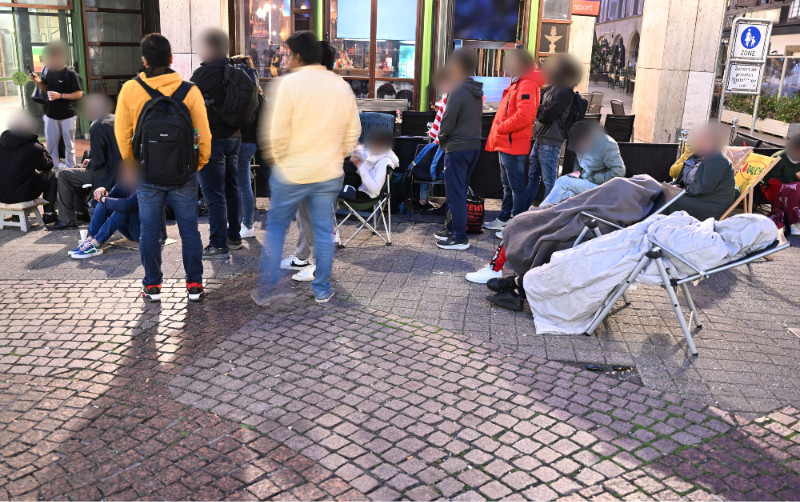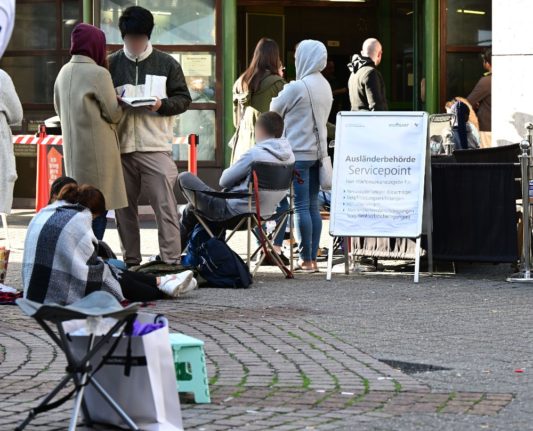The queues stretching down Stuttgart’s Eberhardstraße to the Ausländerbehörde (Foreigner Authority) which have gained considerable media attention over recent months, have disappeared. For now at least.
Following months of criticism from the local expat community, local employers and the German media, a new online appointment system has been established for foreigners with immigration issues that need resolving.
Previously, foreign workers in Stuttgart with queries had to camp overnight outside the office to secure one of the few daily appointments.
Many claimed they repeated the process several times before they gained entry, with some having waited up to nineteen hours.
The new appointment system is only for those whose work permits are about to run out. So those with other immigration issues still face trouble getting the help they need.
READ ALSO: IN DEPTH: Are Germany’s immigration offices making foreigners feel unwelcome?
‘They treat us like trash’
The Local has spoke to two workers about their protracted and difficult experiences with the Stuttgart Ausländerbehörde.
Rahul Arora, from India, said he had been waiting since last September for his Niederlassungerlaubnis (permanent residency permit) and that the limbo meant he was denied new opportunities and it had negatively impacted his health.
“My application freezes my ability to take on a new role, and denies me opportunities here in Stuttgart,” Rahul said.
“I’ve been experiencing high blood pressure since July. The uncertainty of waiting for a response from the immigration office increases stress levels and harms my health,” Rahul addded.
Indonesian Lieke Widowati said she had been one of those waiting for hours in the queue to receive a Fiktionsbescheinigung (temporary residence permit).
“I went there at midnight and I was already number 31 on the list,” she said. “I heard people began queuing at 6pm the say before to gain access because they only let 20 people inside each day. That is crazy.
“We foreigners are students, working, doing vocational courses. We contribute to this country, and they treat us like trash.”

41 positions vacant in the Ordnungsamt
When regional public broadcaster SWR investigated the cause behind the delays, they discovered that over forty staff positions within the Ordnungsamt (public order office), responsible for the Ausländerbehörde, were vacant.
This personnel shortage has severely hampered the city’s ability to process immigration-related cases. The crisis has been worsened by a surge in refugee cases, and delays in the rollout of new computer systems.
Such has been the disruption caused, that some of the regions largest employers, such as Trumpf, contacted Stuttgart’s city government with offers of assistance in processing applications.
In response, Mayor Frank Nopper (CDU) announced in July of this year that sixteen employees from other areas of the city government would be seconded to the Ausländerbehörde in order to offset the crisis.
The Local reported in September how Stuttgart’s authorities were blasted by a business group for the shoddy conditions at the immigration office.
“The unbearable conditions in Stuttgart show that we need different and separate procedures and processes for controlled skilled labour migration, as are currently being discussed with the creation of a central foreigner’s office,” said Oliver Barta, Managing Director of The Association of Entrepreneurs in Baden-Württemberg.
Eventually authorities took action and the online appointment booking service was introduced. It became operational from October 9th.
Doubts remain
Despite the lack of a queues, many local foreign workers still see considerable issues with the operation of the Ausländerbehörde.
Arpan Mandal, from India, suggests the new booking system only solves one problem out of many.
“If you want to change your visa type, for example, from student to work, you cannot ask for an appointment,” he said.
“Sure, they are giving out Fiktionsbescheinigungen with the online appointments, so you can stay, but you may not be able to work. People can lose jobs.”
Mohammed Elgallad, from Egypt, told The Local: “The new system is great for people with emergencies. However, it doesn’t offer any solutions for other problems, like for those who want to change jobs, apply for permanent residency or arrange a family reunion.”
The City of Stuttgart’s press office, where immigration office queries are redirected, has been approached for comment.



 Please whitelist us to continue reading.
Please whitelist us to continue reading.
Member comments